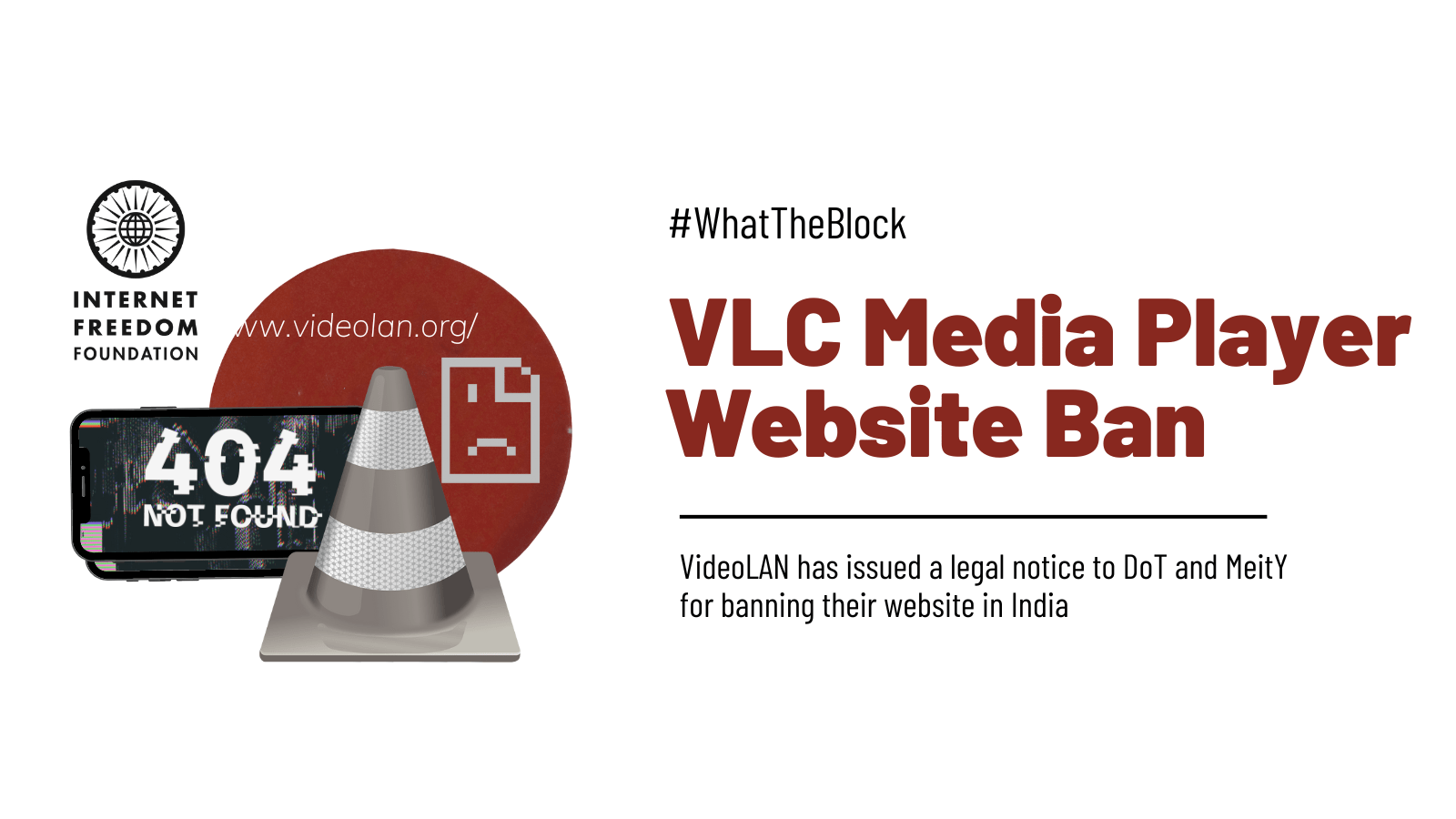
tldr;
VideoLAN’s URL from which users download the VLC Media Player (which is still open-source and ad-free!) appears to have been banned by the Department of Telecommunications (‘DoT’) in India since March 2021. This was done without any prior notice, or affording VideoLAN an opportunity of hearing, which is contrary to the 2009 Blocking Rules and the law laid down by the Supreme Court in Shreya Singhal v Union of India. IFF assisted in the drafting and dispatch of this legal notice.
Why should you care?
Most of us have used the open source software VLC Media Player (‘VLC’) for decades. We could play almost every movie in every format on VLC, without waiting a thousand years for the video to stream over our dial-up connections!
In today's world, VLC continues to remain an open-source, free and ad-free software that can be downloaded on desktops from its website. At a juncture where open-source seems to be the future, such an action against VLC is a statement against the use of open source softwares in India which further stunts innovation and talent.
Background
VideoLAN is a not-for-profit organisation that developed VLC - a free and open source, media player software that was released for public use in 2001. We all use VLC for running various kinds of media files and streaming. Over the years, VLC has grown in scale and has become compatible for use in various devices and platforms. It can be downloaded on desktop operating systems, Android, iOS and iPadOS through various distribution platforms such as Apple's App Store, Google Play, and Microsoft Store, in addition to its website.
VLC is currently being used by 80 million Indians, and has consistently seen an average of 25 million downloads per year in India since its release. For millions of Indians VLC is the primary choice for running all kinds of media formats for free. In March 2022, VideoLAN’s home page was banned in India without any prior notice to VideoLAN.
In June 2022, IFF filed an RTI Application with the Department of Telecommunications (‘DoT’), which was transferred to the Ministry of Electronics and Information Technology (‘MeitY’) seeking information about banning of the URL. However, MeitY responded that no information was available with them.
VideoLAN’s Legal Notice
In its legal notice to the DoT, VideoLAN highlighted the following:
- As per Rule 8 of the Information Technology (Procedure and Safeguards for Blocking for Access of Information by Public) Rules, 2009 (‘Blocking Rules’) and the ruling of the Supreme Court in Shreya Singhal v. Union of India (2015) 5 SCC 1, government officers responsible for issuing a blocking order are required to: (i) make all reasonable efforts to identify the originator or intermediary hosting the information to be blocked, (ii) issue a notice to such person, (iii) provide a hearing to such person before the concerned authority, and (iv) provide a copy of a reasoned blocking order to the person concerned prior to the hearing. Despite this, the URL, which allows users to download VLC was blocked by the DoT without any prior notice, or an opportunity of hearing to VideoLAN.
- Freedom of speech and expression is a paramount human right, recognised under Article 19 of the International Covenant on Civil and Political Rights, and by banning the URL, the DoT is in violation of its international obligations to protect free speech in India. This incident also affects the fundamental rights of all Indian users of VLC who have the right to receive the information freely available on the URL.
- The banning of the URL is shocking because the Government of India itself endorses the use of VLC as a part of its Digital India initiative, where it has expressed its intention to use open-source softwares for government applications. One of the objectives of the National Policy on Information Technology, 2012 is to “adopt open standards and promote open source and open technologies”. Similarly, the Policy on Adoption of Open Source Software for Government of India states in Paragraph 3 that the “Government of India shall endeavour to adopt Open Source Software in all e-Governance systems implemented by various Government organisations…”.
VideoLAN’s demands
In the interest of following legal procedure, VideoLAN has sought the following from the DoT:
- a copy of the reasoned blocking order issued for banning of the URL; and
- an opportunity to defend its case through a virtual hearing.
We believe that VideoLAN is legally entitled to its demands and we hope that the government follows the letter and the spirit of the law in responding to them. IFF assisted in the drafting and dispatch of this legal notice, and we will continue to provide legal assistance to VideoLAN in this arbitrary and illegal exercise of censorship. Further, IFF has been constantly engaged in countering online censorship and the opaque procedures adopted by the Ministries. Donate to IFF to sustain these efforts!
Important Documents:
- VideoLAN’s legal Notice dated September 30, 2022. (link)
- RTI Application seeking information on blocking of VideoLAN’s URL. (link)
